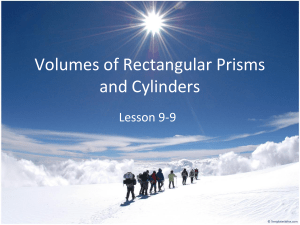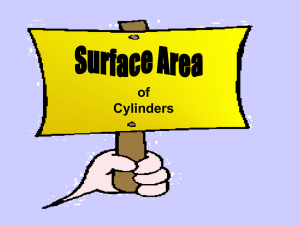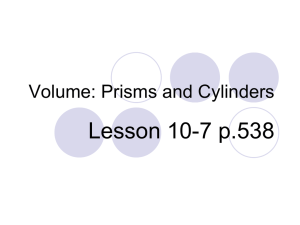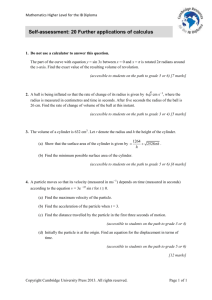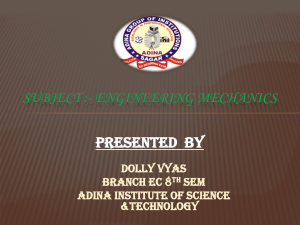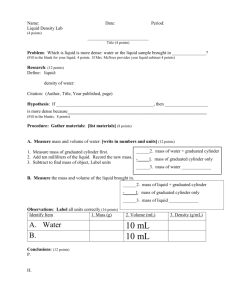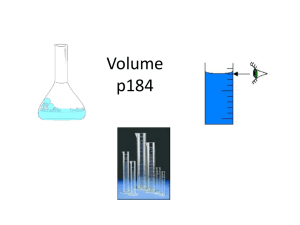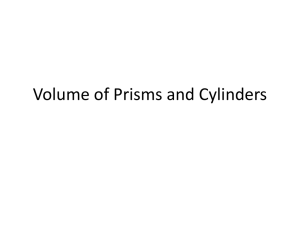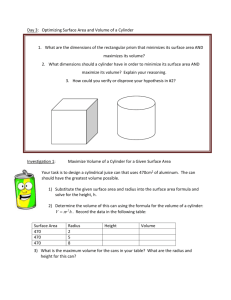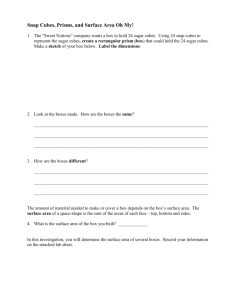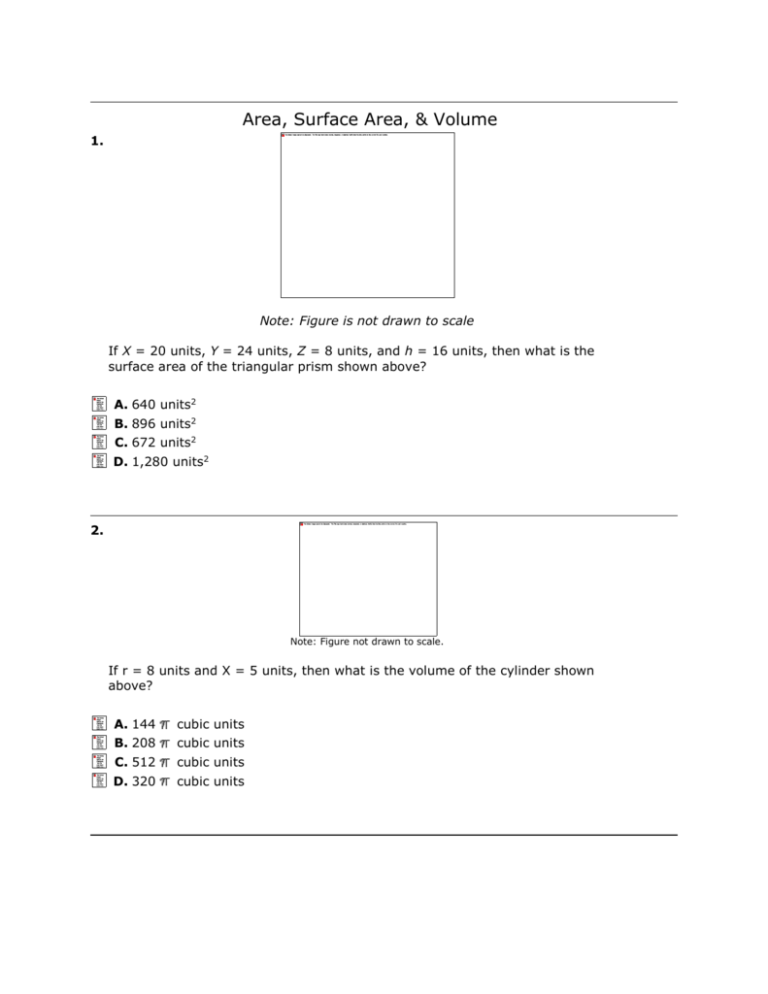
Area, Surface Area, & Volume
1.
Note: Figure is not drawn to scale
If X = 20 units, Y = 24 units, Z = 8 units, and h = 16 units, then what is the
surface area of the triangular prism shown above?
A. 640 units2
B. 896 units2
C. 672 units2
D. 1,280 units2
2.
Note: Figure not drawn to scale.
If r = 8 units and X = 5 units, then what is the volume of the cylinder shown
above?
A. 144
cubic units
B. 208
cubic units
C. 512
cubic units
D. 320
cubic units
3.
Note: Figure not drawn to scale.
If r = 6 units and X = 13 units, then what is the total surface area of the cylinder
shown above?
A. 936
square units
B. 228
square units
C. 540
square units
D. 192
square units
4. The diagram shows a walkway surrounding four identical square picnic areas.
Note: Figure not drawn to scale
If the entire diagram is a square, what is the area, in square feet (sq ft), of the
walkway?
Asquare = s2
A. 2,500 sq ft
B. 4,896 sq ft
C. 7,396 sq ft
D. 6,771 sq ft
5.
Note: Figure is not drawn to scale
If X = 5 units, Y = 6 units, Z = 10 units, and h = 4 units, then what is the
surface area of the triangular prism shown above?
A. 208 units2
B. 114 units2
C. 104 units2
D. 184 units2
6.
Note: Figure not drawn to scale.
Height has been rounded for computational ease.
If h = 9 units, X = 9 units, Y = 5 units, and Z = 16 units, then what is the
volume of the triangular prism shown above?
A. 360 cubic units
B. 720 cubic units
C. 648 cubic units
D. 413 cubic units
7.
Note: Figure not drawn to scale.
If r = 4 units and X = 7 units, then what is the volume of the cylinder shown
above?
A. 64
cubic units
B. 72
cubic units
C. 88
cubic units
D. 112
cubic units
8.
Note: Figure not drawn to scale.
If r = 4 units and X = 9 units, then what is the total surface area of the cylinder
shown above?
A. 176
B. 88
square units
square units
C. 288
square units
D. 104
square units
9. Francisco cut a circle with a radius of 1.5 inches out of a triangle, as shown.
Note: Figure not drawn to scale
What is the area of the remaining shaded region of the triangle?
A.
B.
C.
D.
10.
Note: Figure is not drawn to scale
If X = 6 units, Y = 17 units, and Z = 5 units, then what is the surface area of the
rectangular prism shown above?
A. 510 units2
B. 217 units2
C. 434 units2
D. 502 units2
Answers
1. B
2. D
3. B
4. B
5. D
6. A
7. D
8. D
9. B
10. C
Explanations
1.
In the triangular prism there are 2 congruent triangular faces and 3 rectangular
faces, one of which is the base. Since the two upper rectangular faces have the same
length and width they will have the same area.
To find the surface area, multiply the area of one of the triangular faces by 2,
multiply the area of one of the rectangular faces by 2, and then add those numbers
and the area of the rectangular base together.
Now, use these to find the surface area in the way described above.
2.
To find the volume of the cylinder, use the formula shown below.
Volume =
(radius)2 × height
In the picture of the cylinder, r represents the radius and X represents the height.
Use the values given for these variables in the question to find the volume of the
cylinder.
Volume =
(radius)2 × height
=
(r2)(X)
=
(8 units)2(5 units)
= 320
3.
cubic units
The surface area of a cylinder can be found using the formula given below.
Surface Area of a Cylinder = 2
× (radius)2 + 2
× radius × height
In the picture given in the question, r represents the radius of the cylinder and X
represents the height of the cylinder. Use the values for these variables given in
the question and the formula above to find the surface area of the cylinder.
Surface Area = 2
× (radius)2 + 2
× radius × height
= 2 r2 + 2 rX
= 2 (6 units)2 + 2 (6 units)(13 units)
= 72
= 228
4.
square units + 156
square units
square units
First, find the area of the entire diagram.
Asquare = s2
= (86 ft)2
= 7,396 sq ft
Next, find the area of one picnic area.
Asquare = s2
= (25 ft)2
= 625 sq ft
Then, subtract the area of the four picnic areas from the area of the entire
diagram.
7,396 sq ft - 4(625 sq ft) = 7,396 sq ft - 2,500 sq ft
= 4,896 sq ft
Therefore, the area of the walkway is 4,896 sq ft.
5.
In the triangular prism there are 2 congruent triangular faces and 3 rectangular
faces, one of which is the base. Since the two upper rectangular faces have the
same length and width they will have the same area.
To find the surface area, multiply the area of one of the triangular faces by 2,
multiply the area of one of the rectangular faces by 2, and then add those
numbers and the area of the rectangular base together.
Now, use these to find the surface area in the way described above.
6.
To find the volume of the triangular prism, use the formula shown below.
Volume = Area of the Base × length
In this case, the base is a triangle and the length is represented by Z. To find the
volume, first find the area of the triangular base.
Area of the Triangular Base = 1/2 × base × height
= 1/2 × Y × h
= 1/2 × 5 units × 9 units
= 22.5 square units
Now use the volume formula given above to find the volume.
Volume = Area of the Base × length
= 22.5 square units × 16 units
= 360 cubic units
7.
To find the volume of the cylinder, use the formula shown below.
Volume =
(radius)2 × height
In the picture of the cylinder, r represents the radius and X represents the height.
Use the values given for these variables in the question to find the volume of the
cylinder.
Volume =
(radius)2 × height
=
(r2)(X)
=
=
8.
(4 units)2(7 units)
112
cubic units
The surface area of a cylinder can be found using the formula given below.
Surface Area of a Cylinder = 2
× (radius)2 + 2
× radius × height
In the picture given in the question, r represents the radius of the cylinder and X
represents the height of the cylinder. Use the values for these variables given in
the question and the formula above to find the surface area of the cylinder.
Surface Area =
=
=
=
=
9.
2
× (radius)2 + 2
2
r2 + 2
2
(4 units)2 + 2
32
104
× radius × height
rX
(4 units)(9 units)
square units + 72
square units
square units
First, find the area of the triangle.
Next, find the area of the circle.
Then, subtract the area of the circle from the area of the triangle.
Therefore, the area of the remaining shaded region is 28 - 2.25
inches.
10.
square
A rectangular prism is made of 3 pairs of congruent rectangles.
The top and bottom faces are congruent, left and right faces are congruent, and
front and back faces are congruent.
To find the surface area, find the area of one of the faces from each of these pairs
and then multiply each of them by 2. Then, add the numbers together.
Area of Top Face
= X×Z
= 6 units × 5 units
= 30 units2
Area of Right Face = Y × Z
= 17 units × 5 units
= 85 units2
Area of Front Face = X × Y
= 6 units × 17 units
= 102 units2
Now, use these calculations to find the surface area in the way described above.
Surface Area = 2 × 30 units2 + 2 × 85 units2 + 2 × 102 units2
= 434 units2
Therefore, the surface area is 434 units2.
Copyright © 2012 Study Island - All rights reserved.

